Education | Oct 03, 2022
State-Sponsored Retirement Plans Are Here, but Does Your Business Have Better Options?
Loraine MontanyeCFP®, AIF®
CFP®, AIF®

With Americans living longer, it’s more important than ever for you and your employees to save and invest in preparation for retirement. However, you may be among the 32% of private-industry workers in the United States who don’t have access to retirement plans through their companies.¹
Enter the state-sponsored retirement plan.
The Current Status of State-Sponsored Retirement Plans
In October 2022, Colorado will become the latest of 15 states to implement a state-sponsored retirement plan. Meanwhile, 31 additional states are in various stages of proposing and legislating their own plans.² The vast majority of states are structuring their plans as “auto-IRAs,” which are designed to enable businesses to connect their employees with a retirement savings account while avoiding prohibitive startup and administration costs. While there is some variation in plan structure from state to state, these plans generally have a few things in common:
- Legislation creating the plan mandates that all employers of a certain size either sponsor their own qualified plan or facilitate auto-enrollment and payroll deductions from employees to the state plan.³
- Employee contributions are made on a post-tax basis and are deposited into a portable Roth IRA in the employee’s name.
- Employers cannot make contributions to employee accounts.
- Investment options, service providers, and plan provisions are all selected by state governments.
- Employers pay no cost for the plan.
At first glance, this may seem like an attractive offering. After all, who doesn’t want to minimize costs while also benefitting themselves and their team?
Considerations of State-Sponsored Retirement Plans
If you dig a little deeper though, you might find that the state-sponsored plans are an “okay” fit, but something else might be the right fit. Here’s where the state-sponsored plans may just not cut it for you and your business:
- Auto-IRA plans are typically just Roth IRAs. Roth IRAs can be an enormously effective part of your personal financial plan, but they aren’t always the most suitable tax strategy for everyone when compared to pre-tax or mixed strategies. Furthermore, taxpayers above IRS income limits are not eligible to contribute to Roth IRAs—you may find yourself precluded from participation in your own plan!
- The state selects service providers and investment choices. Imagine being unable to provide any input on who works for your business and letting someone else make all your personnel decisions without knowing a thing about you or what you do—you would likely end up with a staff that can’t support your organization. Likewise, when considering retirement plan investment options and service providers, one size does not fit all.
- The plan is not free to participants. You may not have any business expenses associated with the plan, but anyone who saves through the state plan will still have to pay administrative fees and investment expenses. While it’s normal for participants to pay these fees in any retirement plan, you might want to ask yourself what it is you and your staff are getting for the money.
Benefits of Company-Sponsored Retirement Plans
If you choose to sponsor you own plan, there are some stellar benefits to you and your business:
- First and foremost, you can design the plan in a way that attracts and retains top talent. In a September 2021 survey 65% of respondents said that a “A high-quality 401(k) or other retirement plan” would influence them to leave their current job.⁴ The same survey asked respondents to rank employer financial benefits— “A high-quality 401(k) or other retirement plan” and “401(k) matching program” took the number 1 and number 2 spots.
- Plan participants can save more tax-advantaged dollars through an employer-sponsored plan. The IRA contribution limit in 2022 is generally $6,000 if younger than age 50 while the 401(k) salary deduction limit is $20,500. Employers can also contribute to 401(k) plans for combined total annual deposits of $61,000 per employee.
- All employees can participate in the employer-sponsored retirement plan, regardless of their income levels. This means that you can take advantage of your plan without worrying about whether you make too much money to contribute. In fact, the higher your income, the more impactful your tax savings become.
Comparing Retirement Plan Options
Here’s a brief comparison of some popular options:

How Firms Like DBR & CO Fiduciary Plan Solutions Can Help
While sponsoring your own plan might be worth your serious consideration, it is possible that the cost and execution may still give you pause. This is where firms like DBR & CO Fiduciary Plan Solutions can help you evaluate your options and implement the best solution for your business, whether it be a state plan, your own plan, or participation in a multi-employer plan, such as MEP>One from DBR & CO Fiduciary Plan Solutions, to take advantage of your own custom plan structure with the pricing advantage enjoyed by larger plans. DBR & CO Fiduciary Plan Solutions is a CEFEX-certified retirement plan advisory group held to the highest standards in fiduciary and investment consulting. The firm’s highly credentialed advisors will serve as co-fiduciaries with you to work for the ultimate good of you and your employees.
Thanks for reading.
Footnotes and references:
¹ Your guide to the Pennsylvania Keystone Saves retirement program, Human Interest, December 29, 2021: https://humaninterest.com/learn/articles/keystone-saves-pennsylvania-retirement-program/
² State Initiatives 2022: Several New Programs Will Begin to Enroll Workers, Some Begin Implementation Planning for 2023 Launch, While Others Consider Legislative Proposals and Partnership Opportunities, Georgetown University Center for Retirement Initiatives, July 20, 2022: https://cri.georgetown.edu/states/
³ New Mexico’s program is voluntary.
⁴ The Impact of The Great Resignation on Benefits Needs and Expectations, An Employee Survey from Betterment’s 401(k) Business, Betterment, September 20, 2021: https://resources.betterment.com/hubfs/PDFs/b4b/reports/financial-wellness-benefits-survey.pdf
This material has been provided for general, informational purposes only, represents only a summary of the topics discussed, and is not suitable for everyone. The information contained herein should not be construed as personalized investment advice or recommendations. Rather, they simply reflect the opinions and views of the author. D. B. Root & Company, LLC. does not provide legal, tax, or accounting advice. Before making decisions with legal, tax, or accounting ramifications, you should consult appropriate professionals for advice that is specific to your situation. There can be no assurance that any particular strategy or investment will prove profitable. This document contains information derived from third party sources. Although we believe these third-party sources to be reliable, we make no representations as to the accuracy or completeness of any information derived from such sources, and take no responsibility therefore. This document contains certain forward-looking statements signaled by words such as "anticipate," "expect", or "believe" that indicate future possibilities. Due to known and unknown risks, other uncertainties and factors, actual results may differ materially from the expectations portrayed in such forward-looking statements. As such, there is no guarantee that the expectations, beliefs, views and opinions expressed in this document will come to pass. Information presented herein is subject to change without notice and should not be considered as a solicitation to buy or sell any security. All investment strategies have the potential for profit or loss. Asset allocation and diversification do not ensure or guarantee better performance and cannot eliminate the risk of investment losses.

Loraine Montanye
CFP®, AIF®